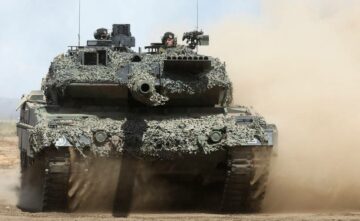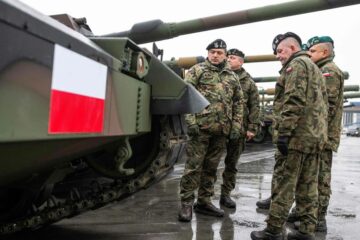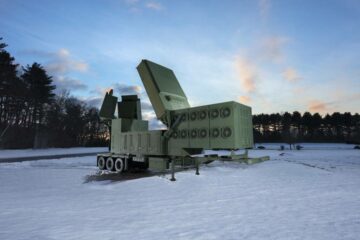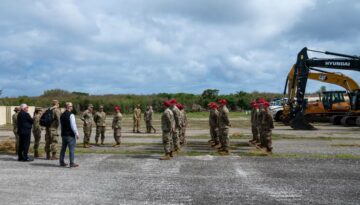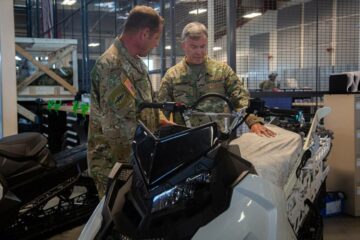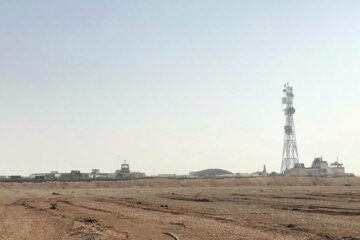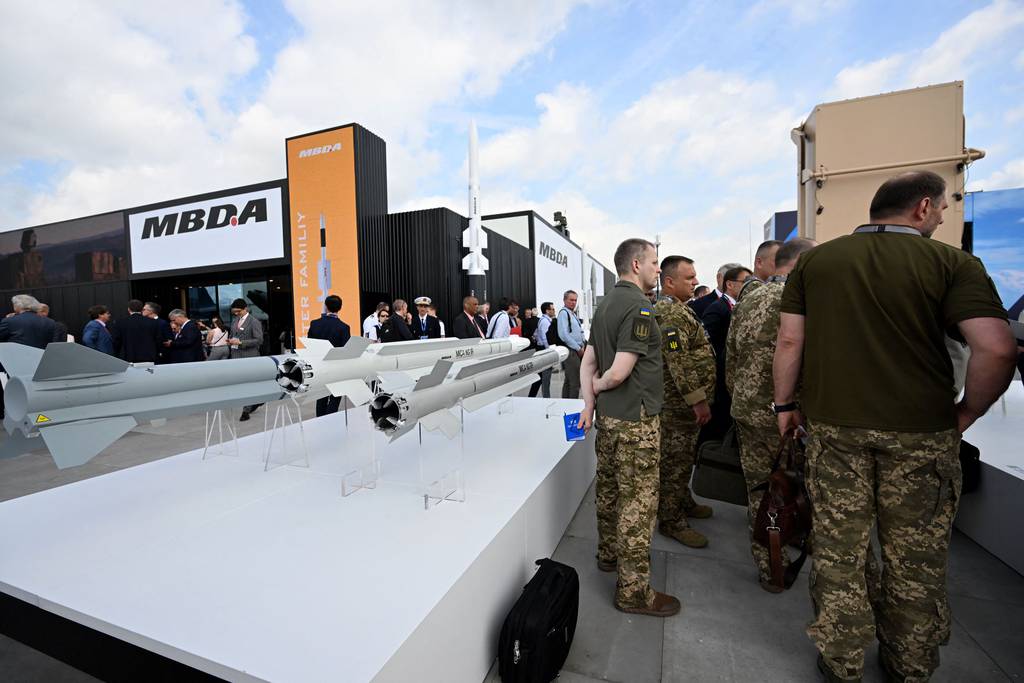
PARIS — Pan-European missile maker MBDA booked record orders in 2023, as countries across the region scrambled to beef up their air defenses in response to Russia’s invasion of Ukraine.
The company’s order intake rose 10% to a record €9.9 billion (US$10.8 billion) last year, Chief Executive Officer Eric Béranger said at a press conference here on March 13. The order book stood at €28 billion at the end of December, from €22.3 billion a year earlier.
“We saw in our orders in 2023 how much air defense is important for countries,” Béranger said. He said air defense will again be important this year. “It’s really a major topic for our governments, and we see that this is the area where we’re asked to accelerate, we’re asked to increase volumes.”
MBDA orders have nearly doubled from 2021, before Russia invaded Ukraine, and 70% of last year’s orders were for air defense. The war in Ukraine has driven home Europe’s need to protect itself against everything from drones to ballistic missiles, with German Chancellor Olaf Scholz setting up the European Sky Shield Initiative and Poland spending billions to modernize its air defenses.
Russia had launched nearly 7,400 missiles and 3,700 Shahed drones against targets in Ukraine as of December, since the start of its invasion in February 2022, according to news reports citing Ukraine’s air force.
In response to the evolving security situation in Europe, France has repeated called on MBDA to speed up its missile production, particularly of the Aster air-defense missiles, used by the French, Italian and British navies, as well as the Franco-Italian SAMP/T air-defense system.
MBDA plans to triple monthly production rate for the CAMM family of missiles between 2022 and 2026, and increase production of Aster by 50% over the period. The company is targeting cutting the time between an Aster order and delivery to 18 months by 2026, from 42 months before 2022.
Aster “was developed in an era where time was not important,” Béranger said. He said the big change after February 2022 “is that suddenly, brutally, time matters.”
MBDA is looking at its entire portfolio to cut delivery times, starting with air-defense products. Legacy issues for Aster production include components that cross the Alps “many times,” something the company would organize differently if it was creating the production line today, the CEO said. MBDA is a joint venture between Airbus, BAE Systems and Leonardo.
MBDA is doubling production capacity at its site in Bolton, U.K., is creating a second final assembly line for CAMM-ER in Italy, and is doubling the site of its final assembly line in France. The company plans to invest at least €2.4 billion over the next five years to expand production capabilities.
The company plans to quadruple monthly throughput of the Mistral short-range air-defense missile between 2022 and 2025, and increase production of the Akeron anti-tank missile 2.5 times.
“All of this is work in progress, and I perfectly understand the impatience of our customers,” Béranger said.
MBDA plans to hire more than 2,500 people this year, after hiring around that number in 2023, and integrating the new hires is the main challenge, rather than recruitment, according to the CEO. The company currently employs around 15,000 people.
Last year’s biggest order came from Poland, with a deal worth more than €2 billion to supply missiles for the country’s PILICA+ program, and a French-Italian order for Aster in early 2023 worth more than €1 billion, according to Béranger. The CEO said 76% of last year’s orders came from European countries other than the five MBDA considers its home market – the U.K., France, Italy, Germany and Spain.
Loitering munitions are a new and growing segment, and MBDA has an ability to integrate explosive charges that can transform dual-use drones into weapon systems, according to Béranger. The CEO said that is not a widespread competence, and the missile maker is working with small and medium-sized drone companies to offer joint products.
“MBDA is not intending to become a drone manufacturer, it is not our job, but creating and offering to our customers weapon systems based on loitering munitions, using drones, this is something where we are very legitimate,” the CEO said.
The company is in talks with Europe-based Organisation for Joint Armament Cooperation about the hypersonic interceptor project Hydis2, and Béranger said he expects to sign a contract with OCCAR within weeks. The CEO said the move will go beyond the matter of providing a demonstrator, and go into “programmatic considerations.”
MBDA is not currently facing any supply-chain shortages, but is stockpiling special grades of iron, as well as titanium and electronic components, something it already started doing in response to the Covid-19 pandemic. Béranger said the company has 80 tons of specific types of iron stocked, compared to requirements of 4 to 5 tons, and has enough titanium for several thousand missiles.
Rudy Ruitenberg is a Europe correspondent for Defense News. He started his career at Bloomberg News and has experience reporting on technology, commodity markets and politics.
- SEO Powered Content & PR Distribution. Get Amplified Today.
- PlatoData.Network Vertical Generative Ai. Empower Yourself. Access Here.
- PlatoAiStream. Web3 Intelligence. Knowledge Amplified. Access Here.
- PlatoESG. Carbon, CleanTech, Energy, Environment, Solar, Waste Management. Access Here.
- PlatoHealth. Biotech and Clinical Trials Intelligence. Access Here.
- Source: https://www.defensenews.com/global/europe/2024/03/13/mbda-books-record-orders-amid-european-air-defense-rush/
- :has
- :is
- :not
- :where
- $UP
- 000
- 13
- 15%
- 2%
- 2021
- 2022
- 2023
- 2025
- 2026
- 4
- 400
- 42
- 5
- 500
- 7
- 70
- 700
- 8
- 80
- 9
- a
- ability
- About
- accelerate
- According
- across
- After
- again
- against
- AIR
- Air Force
- Airbus
- Alps
- already
- Amid
- an
- and
- any
- ARE
- AREA
- around
- AS
- asked
- Assembly
- At
- BAE Systems
- based
- BE
- become
- Beef
- before
- between
- Beyond
- Big
- Biggest
- Billion
- billions
- Bloomberg
- Bolton
- book
- Books
- British
- but
- by
- called
- came
- CAN
- capabilities
- Capacity
- Career
- ceo
- challenge
- chancellor Olaf Scholz
- change
- charges
- chief
- Chief Executive
- chief executive officer
- citing
- commodity
- Companies
- company
- Company’s
- compared
- components
- Conference
- considerations
- considers
- contract
- cooperation
- countries
- country’s
- COVID-19
- COVID-19 pandemic
- Creating
- Cross
- Currently
- Customers
- Cut
- cutting
- deal
- December
- Defense
- defenses
- delivery
- developed
- differently
- doing
- doubled
- doubling
- driven
- drone
- Drones
- Earlier
- Early
- Electronic
- employs
- end
- enough
- Entire
- Era
- eric
- Europe
- European
- European Countries
- Europes
- everything
- evolving
- executive
- Executive Officer
- Expand
- expects
- experience
- facing
- family
- February
- final
- five
- For
- Force
- France
- French
- from
- from 2021
- German
- Germany
- Go
- Governments
- Growing
- had
- Have
- he
- here
- hire
- hires
- Hiring
- his
- Home
- How
- HTTPS
- i
- if
- images
- important
- in
- include
- Increase
- Initiative
- integrate
- Integrating
- Intending
- into
- invasion
- Invest
- issues
- IT
- Italian
- Italy
- ITS
- Job
- joint
- joint venture
- jpg
- Last
- Last Year
- launched
- least
- Legacy
- legitimate
- Line
- looking
- Main
- major
- maker
- Manufacturer
- March
- March 13
- Market
- Markets
- Matter
- Matters
- missiles
- modernize
- monthly
- months
- more
- move
- much
- nearly
- Need
- New
- news
- next
- number
- of
- offer
- offering
- Officer
- on
- order
- orders
- organisation
- Other
- our
- over
- pandemic
- particularly
- People
- perfectly
- period
- plans
- plato
- Plato Data Intelligence
- PlatoData
- Poland
- politics
- portfolio
- press
- Production
- Products
- Program
- Progress
- project
- protect
- providing
- Rate
- rather
- really
- record
- recruitment
- region
- repeated
- Reporting
- Requirements
- response
- Reuters
- ROSE
- rush
- Russia
- Said
- saw
- Second
- security
- see
- segment
- setting
- several
- Shield
- shortages
- sign
- since
- site
- situation
- sky
- small
- something
- Spain
- special
- specific
- speed
- Spending
- start
- started
- Starting
- Stockpiling
- stood
- supply
- system
- Systems
- Talks
- targeting
- targets
- Technology
- than
- that
- The
- The Area
- their
- this
- this year
- thousand
- throughput
- time
- times
- Titanium
- to
- today
- tons
- topic
- Transform
- Triple
- types
- U.K.
- Ukraine
- Ukraines
- understand
- US$10
- used
- using
- venture
- very
- volumes
- war
- War in Ukraine
- was
- we
- Weeks
- WELL
- were
- widespread
- will
- with
- within
- Work
- working
- worth
- would
- year
- years
- zephyrnet

